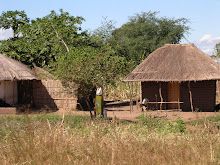
Hiking Mt. Mulanje
July 5, 2009
Even though we missed church this morning, we enjoyed the glories of nature and the majesty of Mt. Mulanje, the third highest mountain in Africa (the highest is Mount Kilimanjaro in Kenya and the second highest is Mt. Kenya). We drove south past Blantyre and on to Thyolo to see the tea plantations and macadamia nut orchards on the way. The tea fields stretch for miles into the horizon, looking like a quilt patterned in shades of green, the paths between large sections provide the stitching.
We got a licensed guide, Lucius Malizani, at a village near the park. He will participate in the Porter’s Race on Saturday, July 11. This race is something like a marathon, only up the mountain and across the side in a designated path. They normally run barefoot; the fastest time last year was 2 hours 20 minutes the told us and the last to finish was around 8 hours. On the hike up the mountain, I talked to a young man who is in the Peace Corps and plans on participating in the Porter’s Race. His goal is to finish.
We hiked to the waterfalls, a fairly large falls with a large lagoon (the guide said 60 meters deep) surrounded by large rocks. Most of the students climb down the overlook to walk on the rocks, wade in the edges of the lagoon, and experience the crashing falls up close. We ate lunch there, and hiked back. We stopped again at the house of a forest ranger to use their toilet, paying them some kwacha for their kindness. I can’t imagine inviting 14 people into your home to use the toilet (the boys went native). People are so kind.
Our driver, Charles, takes us back the short way. On the way down we had seen mpani, what I have called “rats on a stick.” I saw them cooking them on a stove and several boys had sticks loaded with them to sell. Charles stopped the bus for us, and the boys rushed over. We told them we didn’t want to buy but would pay to take pictures. The students were both grossed out and engrossed. But they got some pretty good pictures. I asked Charles how they caught them because I had imagined that they were caught somehow when they burned the fields, which is a constant process during this post-harvest season. Charles said they dug holes in the gardens; then set the fires, and the rats drop into the holes as they scurry from the fire.
We arrived at 5:45 p.m. as darkness settled in. Darkness comes quickly in Africa. Tonight we had one of our buffet dinners with lots of traditional foods: chicken kwasu kwasu, cassava cooked with onions and tomatoes, boiled potatoes, rice, vegetable curry, green beans and carrots, greens, and pigeon peas, which had been a gift from the church. Later Peter, Annie’s son, gave a party for everyone in one of the conference rooms. Several Malawians were there also as well as several Canadians and British. The music was loud and techno! But everyone had a good time. After all, tomorrow is a holiday and schools are closed.
